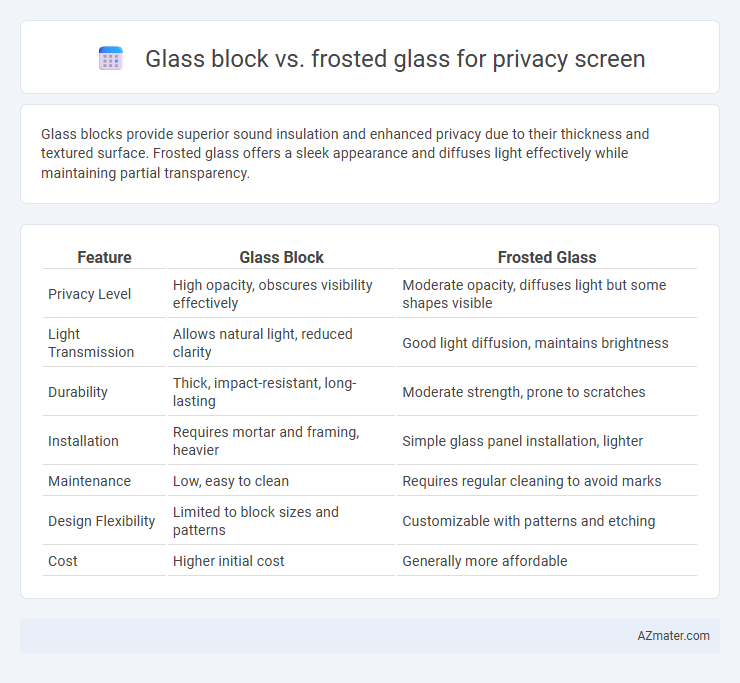Glass blocks provide superior sound insulation and enhanced privacy due to their thickness and textured surface. Frosted glass offers a sleek appearance and diffuses light effectively while maintaining partial transparency.
Table of Comparison
| Feature | Glass Block | Frosted Glass |
|---|---|---|
| Privacy Level | High opacity, obscures visibility effectively | Moderate opacity, diffuses light but some shapes visible |
| Light Transmission | Allows natural light, reduced clarity | Good light diffusion, maintains brightness |
| Durability | Thick, impact-resistant, long-lasting | Moderate strength, prone to scratches |
| Installation | Requires mortar and framing, heavier | Simple glass panel installation, lighter |
| Maintenance | Low, easy to clean | Requires regular cleaning to avoid marks |
| Design Flexibility | Limited to block sizes and patterns | Customizable with patterns and etching |
| Cost | Higher initial cost | Generally more affordable |
Introduction to Privacy Screens
Privacy screens enhance personal or workspace privacy by obstructing direct visibility while allowing light passage. Glass blocks offer a textured, thick structure that refracts light and distorts images, providing strong privacy with added insulation benefits. Frosted glass uses acid-etched or sandblasted surfaces to create a translucent finish that diffuses light softly while maintaining a sleek, modern appearance for privacy needs.
What is Glass Block?
Glass block is a thick, translucent building material composed of two layers of glass fused together, offering strong privacy while allowing natural light to penetrate. Unlike frosted glass, which is a single sheet of glass with an etched or sandblasted surface to diffuse light, glass blocks provide enhanced sound insulation and structural support. The unique construction of glass blocks creates a distinct textured appearance that obscures visibility, making them ideal for privacy screens in bathrooms, offices, and exterior walls.
What is Frosted Glass?
Frosted glass is a type of glass that has been treated with acid etching or sandblasting to create a translucent, matte surface that diffuses light while obscuring visibility, making it ideal for privacy screens. Unlike glass blocks, which are thick, textured, and often used as architectural features, frosted glass offers a sleek, thin profile that fits seamlessly into modern design schemes. Its ability to provide privacy without compromising natural light makes frosted glass a popular choice for bathroom windows, office partitions, and shower enclosures.
Privacy Levels: Glass Block vs Frosted Glass
Glass blocks offer superior privacy by fully obscuring shapes and movements due to their thick, textured design, making them ideal for secure privacy screens. Frosted glass provides moderate privacy by diffusing light and blurring images but may still allow vague outlines and movements to be visible. For maximum privacy, glass blocks are preferred, whereas frosted glass suits areas needing partial light transmission with some privacy.
Design and Visual Appeal
Glass blocks offer a distinctive, textured look with a three-dimensional effect that enhances light diffusion while maintaining privacy, making them ideal for creating decorative, architectural features. Frosted glass provides a sleek, modern aesthetic with a smooth, matte finish that obscures visibility without sacrificing natural light, blending seamlessly into contemporary interiors. Both options balance privacy with design, but glass blocks emphasize bold patterns and structural interest, whereas frosted glass excels in minimalist and subtle elegance.
Installation Process and Requirements
Glass block installation requires sturdy framing and mortar to secure blocks, demanding skilled labor for proper sealing and alignment to ensure durability and privacy. Frosted glass installation is simpler, often involving standard glass mounting hardware and minimal structural support, making it ideal for retrofit projects or quick upgrades. Both options require precise measurements, but glass blocks need more time and expertise due to their weight and grout application compared to the straightforward pane replacement or overlay of frosted glass.
Maintenance and Durability
Glass block offers superior durability and low maintenance due to its thick, solid structure resistant to impact and weathering, making it ideal for long-lasting privacy screens. Frosted glass, while aesthetically pleasing, is more prone to scratches and requires regular cleaning to maintain its matte finish and opacity. Both materials provide effective privacy, but glass block demands less upkeep and better withstands daily wear.
Cost Comparison
Glass blocks generally cost between $30 and $50 per square foot, offering durability and enhanced privacy without requiring additional treatments. Frosted glass typically ranges from $15 to $40 per square foot, providing a more affordable option with customizable levels of opacity but may require frequent cleaning to maintain appearance. Installation expenses for glass blocks can be higher due to weight and complexity, while frosted glass installations tend to be quicker and less labor-intensive, influencing overall project costs.
Energy Efficiency and Light Transmission
Glass blocks provide superior energy efficiency due to their thick, insulated structure that reduces heat transfer while still allowing significant natural light into a space. Frosted glass offers moderate energy efficiency but excels in maximizing diffuse light transmission, creating privacy without significantly dimming interiors. When choosing between the two for a privacy screen, glass blocks balance better insulation and daylight penetration, whereas frosted glass enhances ambient light diffusion with slightly less thermal performance.
Best Use Cases for Each Option
Glass blocks provide excellent privacy while allowing natural light to pass through, ideal for bathroom walls, shower enclosures, and exterior partitions where both security and illumination are priorities. Frosted glass offers a sleek, modern look suited for office partitions, conference rooms, or residential windows needing adjustable privacy without sacrificing style and visibility. Choosing between glass block and frosted glass depends on whether durability and light diffusion (glass block) or design flexibility and partial transparency (frosted glass) are the primary requirements.

Infographic: Glass block vs Frosted glass for Privacy screen
 azmater.com
azmater.com